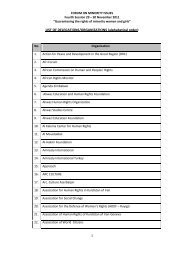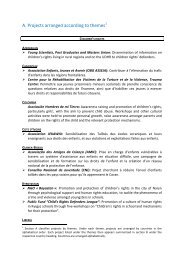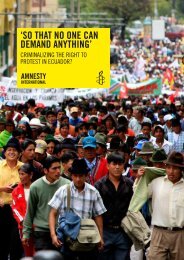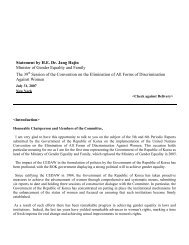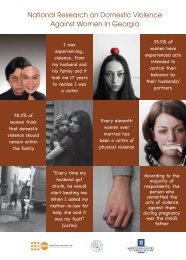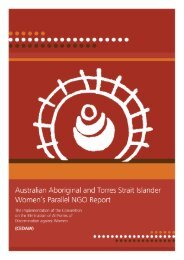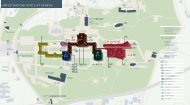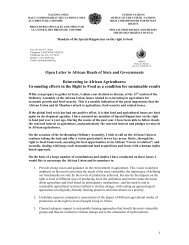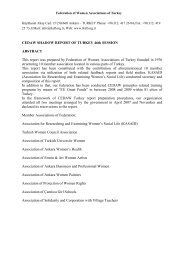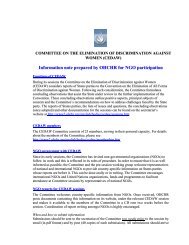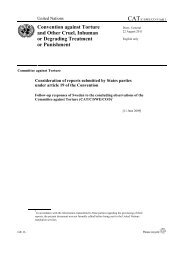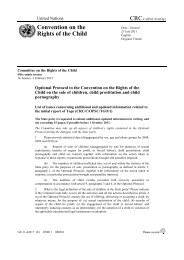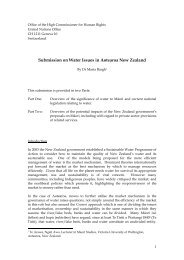Report - Office of the High Commissioner on Human Rights
Report - Office of the High Commissioner on Human Rights
Report - Office of the High Commissioner on Human Rights
- No tags were found...
Create successful ePaper yourself
Turn your PDF publications into a flip-book with our unique Google optimized e-Paper software.
As far as <str<strong>on</strong>g>the</str<strong>on</strong>g> Indigenous Fijian vanua gender ideology c<strong>on</strong>structs, women are seen as <str<strong>on</strong>g>the</str<strong>on</strong>g> helpmate<br />
to a male household leader. Power is c<strong>on</strong>structed openly, and <str<strong>on</strong>g>of</str<strong>on</strong>g>ten aggressively, by chiefs and <str<strong>on</strong>g>the</str<strong>on</strong>g>n<br />
by <str<strong>on</strong>g>the</str<strong>on</strong>g> Indigenous community at large, as being perpetually and unchangeably in terms <str<strong>on</strong>g>of</str<strong>on</strong>g> <str<strong>on</strong>g>the</str<strong>on</strong>g> male<br />
as owner, protector, defender and perpetuator <str<strong>on</strong>g>of</str<strong>on</strong>g> culture.<br />
While, <str<strong>on</strong>g>the</str<strong>on</strong>g>re are individual woman <str<strong>on</strong>g>of</str<strong>on</strong>g> chiefly background or wealth who have high pr<str<strong>on</strong>g>of</str<strong>on</strong>g>iles and access<br />
to power, yet in <str<strong>on</strong>g>the</str<strong>on</strong>g>ir own homes <str<strong>on</strong>g>the</str<strong>on</strong>g> c<strong>on</strong>structi<strong>on</strong> reverts to male as household head/leader and<br />
protector. Gender roles are less rigidly bound today with many women working in <str<strong>on</strong>g>the</str<strong>on</strong>g> cash ec<strong>on</strong>omy,<br />
but it is arguable that for most this has meant that such income is <str<strong>on</strong>g>the</str<strong>on</strong>g>n integrated into <str<strong>on</strong>g>the</str<strong>on</strong>g> overall<br />
household income where <str<strong>on</strong>g>the</str<strong>on</strong>g>re is a male head. There are also single female-headed households but even<br />
<str<strong>on</strong>g>the</str<strong>on</strong>g>se are c<strong>on</strong>structed as coming within <str<strong>on</strong>g>the</str<strong>on</strong>g> male centred and headed ‘mataqali’ or greater family group.<br />
Young people in <str<strong>on</strong>g>the</str<strong>on</strong>g> Indigenous Fijian culture are socialized in an ideology or framework where <str<strong>on</strong>g>the</str<strong>on</strong>g><br />
extended family as collective is idealized. Roles are rigidly prescribed, regardless <str<strong>on</strong>g>of</str<strong>on</strong>g> <str<strong>on</strong>g>the</str<strong>on</strong>g> realities <str<strong>on</strong>g>of</str<strong>on</strong>g><br />
ec<strong>on</strong>omic and social existence, in rural and urban communities. Women are born and socialized into<br />
a household unit, where <str<strong>on</strong>g>the</str<strong>on</strong>g>y are a ‘youth’ until <str<strong>on</strong>g>the</str<strong>on</strong>g>y are married, and <str<strong>on</strong>g>the</str<strong>on</strong>g>n <str<strong>on</strong>g>the</str<strong>on</strong>g>y become part <str<strong>on</strong>g>of</str<strong>on</strong>g> ano<str<strong>on</strong>g>the</str<strong>on</strong>g>r<br />
male-headed household.<br />
Those seen as outside that norm are most <str<strong>on</strong>g>of</str<strong>on</strong>g>ten ridiculed, excluded or censured to varying degrees<br />
- verbally, emoti<strong>on</strong>ally and/or physically. Where <str<strong>on</strong>g>the</str<strong>on</strong>g> n<strong>on</strong>-compliance with social norms is sexual, as<br />
with lesbians, <str<strong>on</strong>g>the</str<strong>on</strong>g> exclusi<strong>on</strong> and oppressi<strong>on</strong> is even worse.<br />
Here we must c<strong>on</strong>sider <str<strong>on</strong>g>the</str<strong>on</strong>g> role <str<strong>on</strong>g>of</str<strong>on</strong>g> religi<strong>on</strong> in Indigenous Fijian life. The majority <str<strong>on</strong>g>of</str<strong>on</strong>g> Fijians still identify<br />
as being Christian, and with <str<strong>on</strong>g>the</str<strong>on</strong>g> rise <str<strong>on</strong>g>of</str<strong>on</strong>g> fundamentalist religi<strong>on</strong>s in Fiji al<strong>on</strong>g with <str<strong>on</strong>g>the</str<strong>on</strong>g> established<br />
Methodist Church in Fiji, <str<strong>on</strong>g>the</str<strong>on</strong>g> idea <str<strong>on</strong>g>of</str<strong>on</strong>g> ‘vanua’ is firmly tied in with Christian values. Therefore, lesbians<br />
are c<strong>on</strong>sidered by many as deviant and seen as committing <str<strong>on</strong>g>the</str<strong>on</strong>g> worst type <str<strong>on</strong>g>of</str<strong>on</strong>g> sins – those <str<strong>on</strong>g>of</str<strong>on</strong>g> abusing<br />
<str<strong>on</strong>g>the</str<strong>on</strong>g> body, which is a temple <str<strong>on</strong>g>of</str<strong>on</strong>g> God.<br />
When many <str<strong>on</strong>g>of</str<strong>on</strong>g> my indigenous extended family look at me <str<strong>on</strong>g>the</str<strong>on</strong>g>y see a deviant, some<strong>on</strong>e who brings<br />
shame to <str<strong>on</strong>g>the</str<strong>on</strong>g> family, some<strong>on</strong>e who is not ‘womanly’ and some<strong>on</strong>e who is a sinner. This is <str<strong>on</strong>g>the</str<strong>on</strong>g> overarching<br />
experience for most indigenous Fijian lesbians and is experienced in greater or lesser degrees depending<br />
<strong>on</strong> individual families, locati<strong>on</strong> and socio-ec<strong>on</strong>omic status. This must first be understood before we<br />
move to specific discriminati<strong>on</strong>s and inadequate access to housing because it impacts directly <strong>on</strong> <str<strong>on</strong>g>the</str<strong>on</strong>g><br />
levels at which our individual human rights are not recognised, how <str<strong>on</strong>g>the</str<strong>on</strong>g>y are not enjoyed and how<br />
<str<strong>on</strong>g>the</str<strong>on</strong>g>y are not exercised. These are our some <str<strong>on</strong>g>of</str<strong>on</strong>g> our stories….<br />
Case Studies:<br />
Case Study 1 – Insecurity and freedom from dispossessi<strong>on</strong><br />
This is my story <str<strong>on</strong>g>of</str<strong>on</strong>g> finding a safe space for my partner and myself. On my fa<str<strong>on</strong>g>the</str<strong>on</strong>g>r’s side I am from Sou<str<strong>on</strong>g>the</str<strong>on</strong>g>rn<br />
Fiji and we retain str<strong>on</strong>g linkages to our village. My mo<str<strong>on</strong>g>the</str<strong>on</strong>g>r is an Australian. I live in Fiji. Since coming<br />
out as lesbian many extended family members have excluded me, but my immediate family still supports<br />
me, which is a huge guarantee. In Fiji, many women face multiple discriminati<strong>on</strong>, in my case for being<br />
indigenous, for being born to a n<strong>on</strong>-indigenous mo<str<strong>on</strong>g>the</str<strong>on</strong>g>r, for being a lesbian, a woman, and also a feminist<br />
and human rights activist. I am seen as violating many unwritten, unspoken but socially and <str<strong>on</strong>g>of</str<strong>on</strong>g>ten<br />
legally enforced social, cultural and ec<strong>on</strong>omic roles, all at <strong>on</strong>ce.<br />
EXECUTIVE SUMMARY 171



